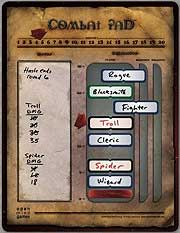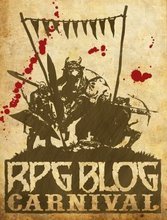This review is part of the Game Cryer Holiday Gift Guide.
Running combat in d2o/3.x systems is no task for the faint-hearted. Multiple characters, each with their own initiative, spells, delayed actions, held actions, potions, magic items … whew! It’s a lot to keep track of and it’s easy to forget who goes after whom … oh, and when does that spell take affect, again? No wonder so many GMs resort to laptops to  keep track of who’s doing what and when.
keep track of who’s doing what and when.
What is it?
 But what about those of us without laptops? Luckily, Paizo.com has a solution for us, too. Called their “Combat Pad“, this sturdy magnetic board takes much of the drudgery out of keeping track of combat. Individual magnets allow you to write the names of the PCs, NPCs and monsters in dry or wet-erase pen. You can also take notes directly on the board itself and there’s a large space on provided to do just that.
But what about those of us without laptops? Luckily, Paizo.com has a solution for us, too. Called their “Combat Pad“, this sturdy magnetic board takes much of the drudgery out of keeping track of combat. Individual magnets allow you to write the names of the PCs, NPCs and monsters in dry or wet-erase pen. You can also take notes directly on the board itself and there’s a large space on provided to do just that.
The center “column” is numbered down the side allowingyou to place character/monster magnets near the number corresponding to each N/PC’s initiative roll. Is one PC readying or holding an action? Just move his magnet to the appropritate column on the right-hand side. Then once the character uses his held action, just move his magnet to the new initiative order number. No more “When did you come in last round?”
The line of numbers across the top allows you to keep track of what round you’re currently in. I also use it to note what round a spell goes off and what round it finishes. After many years of trying to keep track of it in my head or on scraps of paper, this is a very welcome addition to the product.
What’s so good about it?
First of all, large notes section. It allows me to track hit points as well as combat rounds. Secondly, the rounds tracker, which I mentioned above. The fact that it’s magnetic means I don’t have to worry if the cat decides to take a short-cut across my notes during combat.
I generally use wet-erase markers (I’m always dragging my hand through what I write, so dry-erase for me ends up being one big blur) and both the magnets and the board come clean with a damp cloth or paper towel. And when I say clean, I mean clean. No color residue left. The different colors of magnets — blue for PCs, green for NPCs and black for monsters — makes it easy to tell at a glance which you’re dealing with right now. The board comes with a good number of magnets, but if you lose some or find you need more, Paizo offers an extra magnet pack.
I also like the size. While a larger board would allow for more notes, the current 81/2″ x 11″ fits easily into my game notebook. Which means I can carry it with me wherever I’m running. A big bonus, since our group tends to rotate hosting the game. And it works for more than d20; I’ve used it with my Vampire: the Masquerade game with the same success.
The price tag for this product — $16.95 — is very reasonable. The extra magnet pack is $7.95. It’s a great gift for that special GM.






